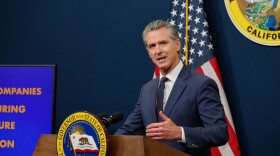There are surprising and distressing similarities between the war crimes committed by Nazis in World War II and what is happening in Ukraine right now as Russia continues its violent assault, according to Department of Justice official Eli Rosenbaum.
Rosenbaum is best known for leading the Justice Department unit that tracked down Nazis in hiding long after World War II. And last month, Attorney General Merrick Garland tapped him to lead a team investigating atrocities in Ukraine.
The law only allows Rosenbaum's team to investigate the relatively few cases of war crimes involving U.S. nationals in Ukraine, but his team will be sharing information with war crimes investigators from dozens of other countries.
Rosenbaum spoke with All Things Considered about the War Crimes Accountability Group, and shared the process of his work as well as how optimistic he is of justice being served.
This interview has been lightly edited for length and clarity.
Interview highlights
On what kind of evidence is needed to prove a war crime case
These are challenging investigations. I think the work that we've done over many years in this space has prepared us well for this urgent mission. There will be all kinds of evidence.
What we probably won't have very much of is the kind of evidence that we had in the Nazi cases, which was primarily captured Nazi documents. We won't have much in the way of documents, mostly because not much is reduced to paper writing anymore. On the other hand, there are electronic communications and the various governments have advanced capabilities to intercept and analyze such communications, and their state of the art investigative techniques that could not be deployed in the Nazi cases, like DNA analysis and geofencing.
On how various countries work and gather together to investigate war crimes
Coordination is key. We are working hard to de-conflict, as they say, and avoid duplication of effort. That was a major reason for the gathering to be held under the sponsorship of the Dutch government and the ICC and the European Commission.
Basically, the Ukrainian authorities will be in the best position, most likely to help us coordinate and de-conflict and we'll be able to do that.

On the difficulty of gathering evidence and prosecuting cases in ongoing war zones
The fact that the war is still underway obviously brings new challenges, too. But it doesn't prevent us from doing capable investigations. So fundamentally, this new mission is a continuation of the one that my colleagues and I have been privileged to be part of for many years at the U.S. Department of Justice.
The work is aimed at securing a measure of justice on behalf of the victims. In the case of Russia's invasion of Ukraine, the offenses are ongoing, and the crime scenes in some instances are going to be difficult to reach, or even for some time impossible.
But the fact that the crimes are ongoing means that these cases are of the very highest urgency. And there is this eternal fantasy of all prosecutors, that timely law enforcement accountability efforts have the potential to deter at least some people from engaging in, or continuing to engage in ghastly crimes.
On the possibility of justice being served after war crimes in Ukraine
I'm optimistic that justice will be obtained. It doesn't always happen right away. There are many, many instances of perpetrators of atrocity crimes, even the leading figures in a government like [former President of Serbia] Slobodan Milošević being brought to the bar of justice. It takes time.
But I am optimistic that what Attorney General Garland said when we were together in Ukraine last month is to be reality in these cases. He said, "There is no hiding place for war criminals."

On Vladimir Putin saying this invasion of Ukraine is an effort to de-Nazify the country
When I hear that, for me, it's like fingernails on a chalkboard times a thousand. It's cruel. It's false. This is not a Nazi government by any stretch of the imagination. I think after almost 40 years of investigating and prosecuting Nazi perpetrators, I know a Nazi when I see one. This is yet another outrage from the Kremlin.
Copyright 2022 NPR. To see more, visit https://www.npr.org. 9(MDAzMjM2NDYzMDEyMzc1Njk5NjAxNzY3OQ001))








